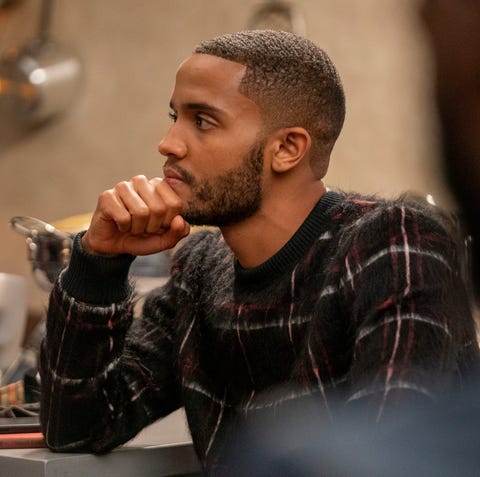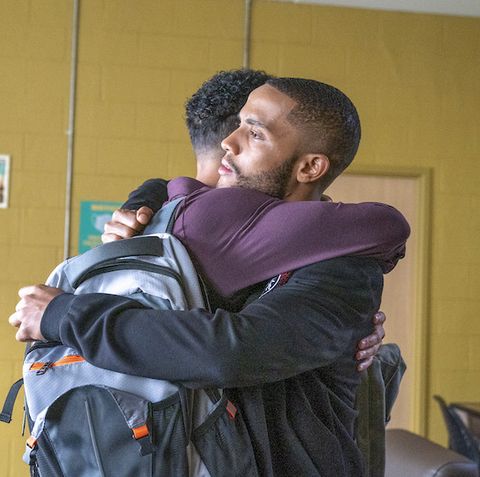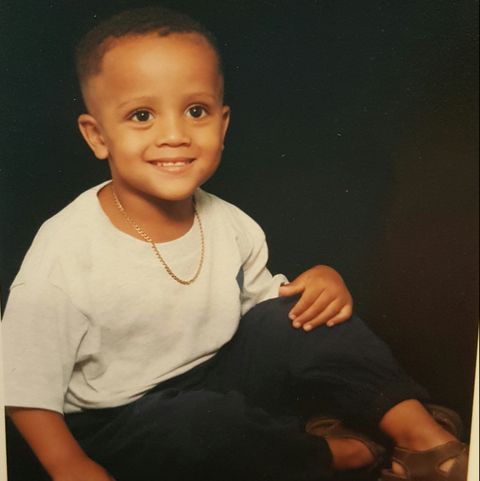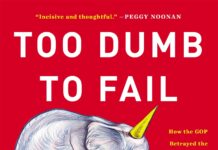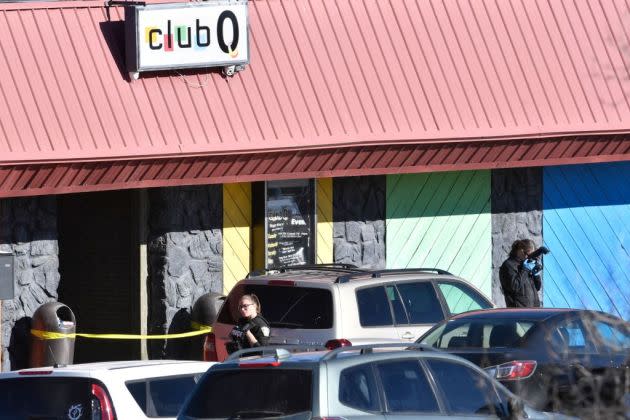Queen Sugar’s Nicholas Ashe didn’t set out to make a political statement when he and his then-boyfriend, actor Justice Smith, revealed their relationship during the summer of 2020. Smith, best known for his roles in blockbusters like ” data-vars-ga-product-id=”7dc68a91-60b7-47ed-9864-c65505737c14″ data-vars-ga-product-price=”0.00″ data-vars-ga-product-sem3-brand=”” data-vars-ga-product-sem3-category data-vars-ga-product-sem3-id data-affiliate-network=”{"id":"31518d15-56f8-4a3f-8799-806de6452d82","metadata":[],"network":{"id":"469ce69f-4798-416d-9432-eaa9954b4053","name":"Amazon","metadata":[]}}” data-affiliate=”true”>Pokémon Detective Pikachu and Jurassic Park: Fallen Kingdom, took to Instagram to call out the lack of solidarity and support for the LGBTQIA community he witnessed at a Black Lives Matter protest in New Orleans. At the time, Ashe, 26, was shooting the fifth season of the critically acclaimed OWN series, Queen Sugar.
Smith went on to declare his love for Ashe in a series of photos, including one of them kissing. He said of Ashe, “You’ve been my rock and guiding light through all of this and I love you so much. I know that on the other side of this is change, though the fight is far from over.”
Ashe, who plays the sensitive and socially conscious Micah West on Queen Sugar, admits that until that day, his own engagement on social media was limited to mostly a professional capacity. “My Instagram mostly consists of posts that say, “Watch Queen Sugar. Don’t forget to watch Queen Sugar,” Ashe tells Oprah Daily. Within a day, his personal life was a headline.
Even with the mostly positive feedback on social media, Ashe was attuned to the risks and reality of being an openly queer Black man. “RuPaul said he was shunned by whites for being Black, hated by Blacks for being gay, and he was hated by the gays for being too femme. That really resonated with me. In high school, the worst thing you could be was gay. ‘You’re sus.’ That was the pejorative that they used,” he says.
Ashe credits his mother, who died in October 2020, as being a constant and stabilizing force in his life while coming to terms with his sexuality and sharing it publicly. Two months after the initial post, Ashe posted his own loving birthday tribute to Smith: “Justice, you have been the author of all my recent smiles.”
Below, Ashe shares his journey to queer liberation and how he hopes his honesty and authenticity will be a beacon to other queer Black men, both through his personal example and his art.
After seven years of starring in OWN’s Queen Sugar, fans know me as Micah West. But until last summer, I kept the real Nic Ashe hidden from the public eye. So people were surprised when, last summer, I showed some of myself…and unintentionally came out in an Instagram post.
When my then-boyfriend, Justice Smith, shared pictures of us at a Black Lives Matter protest in June of 2020, I was thinking, “I’m just posting me and my boo doing the Lord’s work in these streets.” But I can be oblivious at times. This was the first time I had posted someone that I loved in that way, with such intimacy. I honestly did not expect the post to go viral, for the internet to implode, for magazines to reach out and ask me to comment. I was just posting my loved one the same way my bro just posted his girlfriend for her birthday. I didn’t foresee it blowing up the way that it did.
Almost immediately, my manager called me. She said, “Nic, what is this? We had no idea.” She was in panic mode, saying, “You never have talked about this. Was it an accident? We can reverse it.” I’d never spoken about my dating life with her, which I didn’t realize until that moment. It wasn’t that I was hiding who I was—I just tend to keep relationships private. Other people in my life were surprised, too. At one point I said to myself, “Damn, I never told Uncle Ricky that I’m gay? We never did that?” It was funny to read those messages.
But overall, the reaction was overwhelming—I had to leave Instagram for a while. I get anxiety sometimes, and this didn’t help. When I finally got back on Instagram, I realized the power of social media. People were reaching out to me from all over the world, talking about how they felt seen from the posts. I got a lot of “thank you’s.” People felt that I had done something brave by sharing this on a platform so large.
Reading these responses, I realized I wanted my future roles to speak to them. I am them. They might look up to me because of my profession. But really, I stand among them. I stand on the shoulders of the community of people who look like me and love like me who have come before me. I’m advocating for the future generations, for them to live in a more inclusive, tolerating space, through my work.
So I’m thankful that I’m getting to do that on season six of Queen Sugar. Creator Ava DuVernay wanted to speak to Black male queerness through my character, Micah. She asked me to hold her hand through that process to make sure that we were telling a story that we both could be proud of and that was informed by my own experience as a Black queer man.
The conversation we’re having on Queen Sugar is more than just a juicy, gossipy storyline where Micah kisses a boy. It’s not that. It’s asking, “How Black men are allowed to love one another in America?”
So much of Micah’s learning has mirrored mine. We’re only two years apart in age. When I look back at season one of Queen Sugar, I see this doe-eyed character who doesn’t know what’s going on. At the same time, Nic was entering Hollywood and being on sets for the first time and had the same doe-eyed expression. Now, when I look at Micah’s growing storylines, I feel I have more say as an actor—and I get to use Queen Sugar to talk about what matters to me.
The latest season of Queen Sugar is especially meaningful because representation in art is what helped me understand my own sexuality growing up. When I was 10, I appeared in The Lion King on Broadway—my first job ever. I was one of a bevy of Black performers. Backstage, I encountered my first memorable instance of queer representation, without realizing it. Something attracted me to certain performers, who I now realize were queer. I said to myself, “Oh, I think I’m like Jeremiah. I think I’m like Clifton and Jason.” They were in a safe space, able to be who they were and support themselves by doing what they loved. The Lion King opened my eyes to a possible life for me.
When I was 17, I was a part of making queer art. I worked with Tarell Alvin McCraney, the screenwriter of Moonlight and OWN’s David Makes Man, for his coming-of-age play Choir Boy. It was the first time I made queer art with other queer Black men. When I had to miss my high school prom, the cast threw me a fake one and gifted me books by queer and Black authors. I felt so fortified and seen.
Still, even as I became clearer in my understanding of my identity, I took my time in actually expressing it. I was very lucky that I had a superhero of a mom who saw those pieces of me but didn’t rush to name them. She never forced me to “come out.” But in an effort to connect with me, to let me know that we live in a safe space, she would have to talk to me about any gay thing that happened. She’d be like, “Well, you know RuPaul’s Drag Race. You ever watch RuPaul’s Drag Race?” I’m like, “No, mom.” Every gay thing, she would just have to tell me.
Then one day, on a drive near our house in Long Island when I was a late teenager, she was telling me about another one of these “gay things.” I forget what, exactly—something she had been watching on the news. I became exasperated by how heavy-handed she was being. I was like, “Well, you know I’m gay.” She responded, “I know, but I’m not talking about you. I’m talking about this other thing.” She just continued talking about that, seamlessly.
After opening up to my mom in that casual exchange, our relationship blossomed. There were no walls between us. She could speak to me about her experiences in love, and so could I. I’m so glad that I got to share that level of intimacy with her. She died in October 2020. Because of how open I was—and how open she allowed me to be—I have no regrets about her relationship. I know that would be something I would beat myself up about, not letting her see all of me.
Even if it was on a whim, that’s what I did by sharing the post last summer—shared all of me.
Even if it was on a whim, that’s what I did by sharing the post last summer—shared all of me. When I started Queen Sugar in 2016, I felt I had to hide my queerness, the part of me that made me so special to my friends and loved ones. I felt it was something that I had to keep secret.
Now, I feel more at peace with myself. I haven’t lived my full life to see how the decision to come out will inform the rest of my career, but I know that karma will kiss me for it and that the universe at large will reward my authenticity. There definitely was a fear of me being authentic, but ultimately I want to live honestly. I use my platform to advocate for people who look and love like me.
This content is created and maintained by a third party, and imported onto this page to help users provide their email addresses. You may be able to find more information about this and similar content at piano.io



